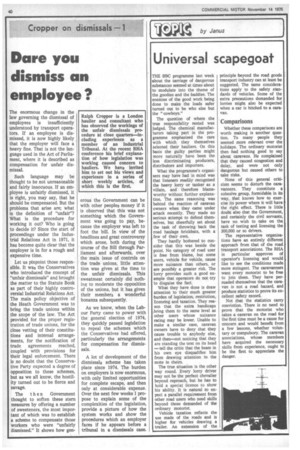Universal scapegoat
Page 42

If you've noticed an error in this article please click here to report it so we can fix it.
THE BBC programme last week about the carriage of dangerous substances seemed at times about to modulate into the 'theme of the goodies and the baddies. The enemies of the good work being done to make the loads safer turned out to be who else but the "cowboys."
The question of where the true responsibility rested was judged. The chemical manufao. tuners taking part in the programme emphasised the care with which they themselves selected their hauliers. On this basis the guilty parties might more naturally have been the less discriminating producers, distributors and importers.
What the programme's organisers may have had in mind was that listeners readily recognised the heavy lorry or tanker as a villain, and therefore blameworthy without further explanation. The same reasoning was behind the reaction of caravan owners when they came under attack recently. They made no serious attempt to defend themselves, but cheerfully set about the task of throwing back the road haulage brickbats, with a few of their own.
They hardly bothered to consider that this was beside the point. No category of road user is free from blame, but some users, vehicle for vehicle, cause more nuisance than others, or are possibly a greater risk. The lorry provides such a goad example that operators do not try to disguise the fact.
What they have done is draw attention to their much greater burden of legislation, restriction, licensing and taxation. They reason that the extra handicaps being them to the same level as other users whose nuisance rating may be lower. Unable to make a similar case, caravan owners have to deny that they cause trouble to anybody else, and then—not noticing that they are standing the text on its head —tell the critic that the beam in his own eye disqualifies him from drawing attention to the mote in theirs.
The true situation is the other way round. Every lorry driver may not be the perfect chevalier beyond reproach, but he has to hold a special 'licence to show his ability. It is natural to expect a parallel requirement from other road users who need skills beyond those demanded of the ordinary motorist.
Vehicle taxation reflects the use made of the roads and is higher for vehicles drawing a trailer. An extension of the principle beyond the road goods transport industry can at least be suggested. The same considerations apply to the safety standards of vehicles. Some of the extra precautions demanded for lorries might also be expected when a oar is hitched to a caravan,
Comparisons
Whether these comparisons are worth making is another question. To many people they seemed more relevant over the holidays. The ordinary motorist then had nothing good to say about caravans. He complained that they caused congestion and delay, and were not only dangerous but caused others to take risks.
None of this general criticism seems to disturb the carevanners, They constitute a cohesive group, formidable in its way, that knows how to exercise its power where it will have the right effect. There is little doubt also that the Government, and certainly the civil servants, have no, wish to take on the task of testing and licensing the 300,000 or so drivers.
The representative organisations have an entirely different approach from that of the road transport associations. The RHA in particular approves of operator's licensing and would like to see the conditions made more stringent. The caravanners want every motorist to be free to join them. They have persuaded themselves that the caravan is not a road hazard, and produce statistics to prove its excellent safety record.
Not that the statistics carry conviction. There is no need to prove that the motorist who takes a caravan on the road for the first time must be a cause for concern and would benefit from a few lessons, whether voluntary or compulsory. The caravan associations, whose members have acquired the necessary skills from experience, ought to be the first to 'appreciate the danger.




























































































































